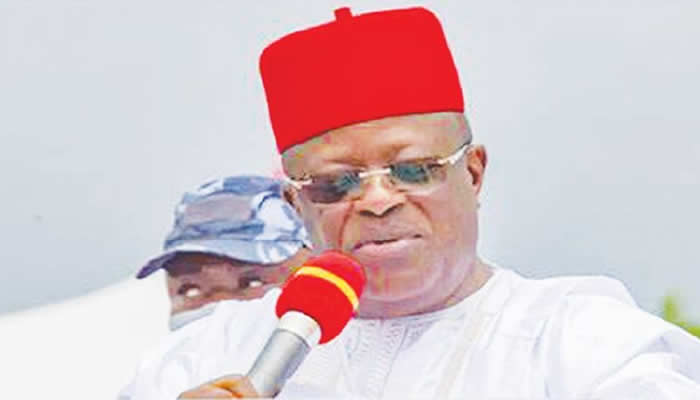The Enugu-Onitsha Expressway, a crucial artery in southeastern Nigeria, has become a focal point of contention due to its protracted incompletion and the associated escalating costs. Minister of Works, David Umahi, has issued a stern ultimatum to MTN, the telecommunications giant funding the project under the Road Infrastructure Development and Refurbishment Investment Tax Credit Scheme, demanding a monthly payment of N15 billion to the contractors, RCC Ltd., for the next ten months. Failure to comply with this mandate, the minister warned, would result in the termination of the contract. This decisive action comes in response to concerns raised by a delegation of National Assembly members from Anambra and Enugu states, who highlighted the detrimental impact of the delays on the local populace, including the tragic loss of lives due to accidents on the dilapidated sections of the expressway.
The minister’s ultimatum underscores the gravity of the situation, which has seen the project cost escalate by over 100% due to insufficient funding and sluggish contract execution. Umahi expressed apprehension that further delays could inflate the cost by a staggering 200%, a scenario deemed unacceptable by the Federal Government. The core issue at hand is the perceived inadequate commitment from MTN, with the ministry asserting that the company’s current funding approach deviates from the stipulations of the Tax Credit Executive Order. To expedite the project’s completion, the ministry proposes engaging three additional contractors to work alongside RCC on the existing 79km stretch within the original N202 billion budget. The remaining 72km will be open to competitive bidding, allowing MTN and RCC to participate in the tender process.
Beyond the immediate concerns surrounding the Enugu-Onitsha Expressway, the meeting touched upon broader infrastructure challenges and political dynamics within the South-East region. Minister Umahi acknowledged the extensive road infrastructure deficit in the South-East and other geopolitical zones, emphasizing President Bola Tinubu’s commitment to addressing these issues. He highlighted the president’s inheritance of a substantial portfolio of 2,064 projects, initially valued at N13 trillion but now exceeding N20 trillion due to currency fluctuations and fuel subsidy removal. Despite these economic headwinds, Umahi expressed confidence in Tinubu’s resolve to transform Nigeria’s infrastructure landscape. He commended the president’s efforts to foster peace and stability in the South-East, noting the absence of farmer-herder clashes since Tinubu assumed office.
The National Assembly delegation, led by Senate Minority Whip Osita Ngwu, commended Minister Umahi’s nationwide efforts in road construction, rehabilitation, and maintenance, while also expressing concerns about funding shortfalls impeding timely project completion. Ngwu underscored the urgency of the Enugu-Onitsha Expressway issue, citing the recent tanker explosion on the Ugwu Onyeama section as a compelling reason for their visit. He pledged the lawmakers’ full cooperation in resolving the bottlenecks hindering the project’s progress. Senator Victor Umeh, representing Anambra Central, echoed these sentiments, appealing for expedited funding for road projects in the South-East to ensure the region benefits fully from the administration’s economic development agenda. He lauded President Tinubu’s selection of Umahi as Minister of Works, citing his impressive track record in infrastructure development as former Governor of Ebonyi State.
The Enugu-Onitsha Expressway saga exemplifies the complex interplay of infrastructure development, funding mechanisms, and political considerations in Nigeria. The minister’s decisive action reflects the government’s determination to hold stakeholders accountable and accelerate critical infrastructure projects. The involvement of the National Assembly delegation highlights the collaborative efforts required to address infrastructure deficits and improve the lives of citizens, particularly in underserved regions. The ultimatum to MTN signifies a potential turning point in the project’s trajectory, with the potential for either accelerated progress or a complete restructuring of the contractual arrangements. The outcome of this standoff will have significant implications for the future of road infrastructure development in the South-East and beyond.
The broader context of President Tinubu’s infrastructure development agenda and efforts to promote peace and stability in the South-East further underscore the significance of the Enugu-Onitsha Expressway project. By addressing these critical infrastructure gaps, the government aims to stimulate economic growth, improve connectivity, and enhance the quality of life for citizens. The ongoing dialogue between the Federal Government, the National Assembly, and private sector stakeholders like MTN demonstrates the importance of collaborative partnerships in achieving sustainable development goals. The Enugu-Onitsha Expressway serves as a microcosm of the broader challenges and opportunities facing Nigeria’s infrastructure sector, highlighting the need for effective funding mechanisms, efficient contract execution, and transparent governance to ensure that vital projects are completed effectively and deliver tangible benefits to the population.














